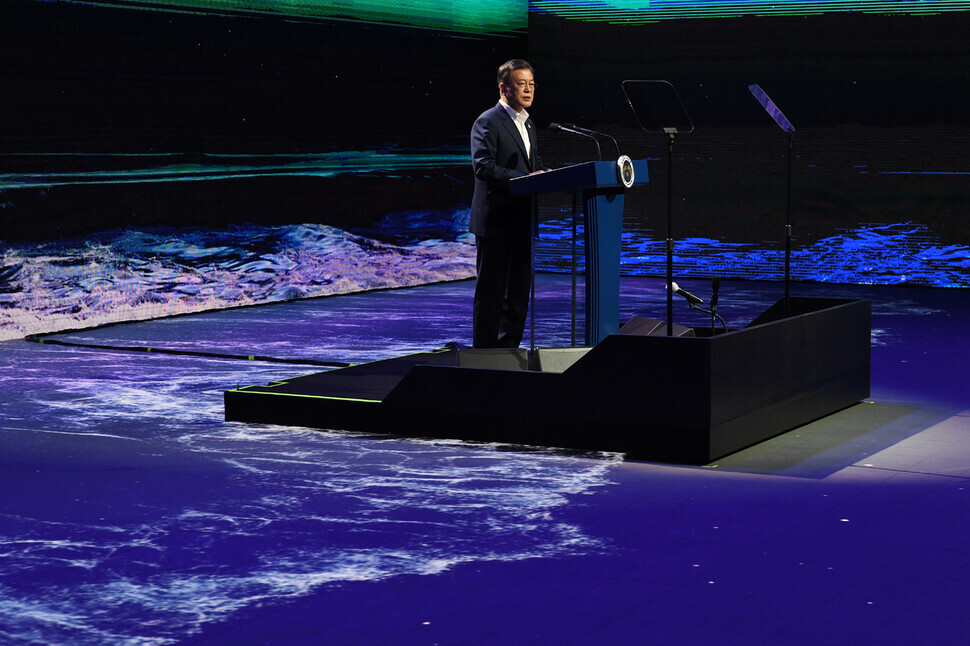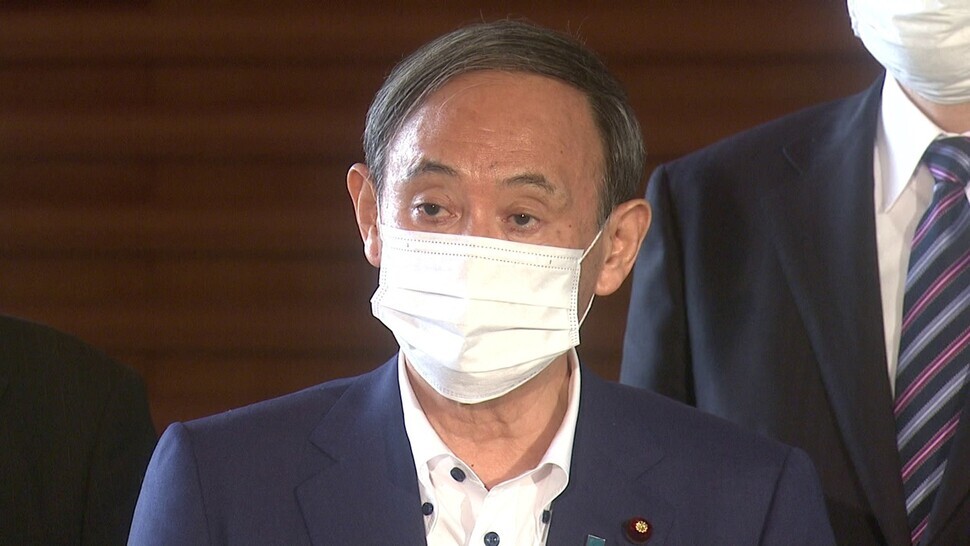hankyoreh
Links to other country sites 다른 나라 사이트 링크
Suga insists on “appropriate response” from Seoul regarding forced labor issue in telephone summit with Moon

“I hope that we can work together to find an optimal solution that is acceptable to both countries’ governments and all the parties involved.” - South Korean President Moon Jae-in
“I will strongly insist upon an appropriate response from South Korea.” - Japanese Prime Minister Yoshihide Suga
A telephone summit between the leaders of South Korean and Japan on Sept. 24 provided an opportunity to feel out the views of the newly inaugurated Japanese prime minister on bilateral relations, which have been on a straight downhill path in recent years. According to an announcement by Blue House Spokesperson Kang Min-seok following the 20-minute conversation, Moon began by congratulating Suga on his inauguration and went on to describe the relationship between South Korea and Japan as one of “the closest friends” and “partners who should be cooperating” and to call for “hastening communication to resolve current issues.” In response, Suga reportedly expressed hope that “our relationship can be built in a future-oriented way” and agreed on the need for “dialogue and efforts to resolve current issues.”

But the mood reported by Japan was quite different. Attending a simplified press conference shortly after the summit, Suga said he had emphasized to Moon that “our countries’ relationship cannot be left in its current, very difficult situation with issues such as those involving workers from the Korean Peninsula [victims of forced labor mobilization].” He also reiterated the Japanese government’s basic position that it would “strongly insist upon an appropriate response from South Korea based on our consistent position to date.”
While South Korea stressed the need for joint efforts by the two sides to resolve the difficult issue of compensating forced labor survivors with its reference to an “optimal solution acceptable to all parties involved,” Japan adhered to its previous position that the party responsible for solving the issue is South Korea alone, rather than both sides.
S. Korea uses amicable words like “friends” and “partners,” while Japan uses neutral words like “neighbors”The “consistent position” referred to by Suga that day was expressed in a Sept. 16 press conference by Japanese Foreign Minister Toshimitsu Motegi -- namely that South Korea “violated international law” with its Supreme Court ruling on the forced labor issue in October 2018, and that it is obligated to take corrective action. While South Korea focused on emphasizing amicable relations with the use of expressions like “friends” and “partners,” Japan used only neutral expressions with its references to “neighbors” and the “Japan-US-South Korea alliance” against North Korean threats.
With this confirmation of Suga’s hardline position on the forced labor compensation issue, the South Korean government’s hopes of improving relations quickly -- with Moon sending a congratulatory cable on Sept. 16 expressing his “hope for Japan’s proactive response” -- are facing uncertain prospects. The two sides have failed to make any process in the nine months since December 2018, when a summit between the South Korean and Japanese leaders produced an agreement to “continue dialogue between foreign affairs authorities toward resolving issues.”
The next focus is on plans for a trilateral summit with China later this year, which South Korea will host. An in-person meeting between Moon and Suga there could inject momentum into talks between authorities, which have currently stalled due to factors involving the COVID-19 pandemic. South Korea and China both shared positive stances on the summit during a South Korea visit in late August by Yang Jiechi, a Chinese Community Party Politburo member in charge of foreign affairs.
But Japan has yet to say anything definite about the holding of a trilateral summit. Tokyo is reportedly deeply concerned about the potential for serious damage if the liquidation of Japanese company assets seized by courts in connection with the forced labor ruling goes ahead after Suga visits South Korea. This suggests a visit is unlikely to come about without “significant progress” on the forced labor issue, such as a postponement of the liquidation measures.
By Gil Yun-hyung and Seong Yeon-cheol, staff reporters
Please direct comments or questions to [english@hani.co.kr]

Editorial・opinion
![[Column] Park Geun-hye déjà vu in Yoon Suk-yeol [Column] Park Geun-hye déjà vu in Yoon Suk-yeol](https://flexible.img.hani.co.kr/flexible/normal/500/300/imgdb/original/2024/0424/651713945113788.jpg) [Column] Park Geun-hye déjà vu in Yoon Suk-yeol
[Column] Park Geun-hye déjà vu in Yoon Suk-yeol![[Editorial] New weight of N. Korea’s nuclear threats makes dialogue all the more urgent [Editorial] New weight of N. Korea’s nuclear threats makes dialogue all the more urgent](https://flexible.img.hani.co.kr/flexible/normal/500/300/imgdb/original/2024/0424/7317139454662664.jpg) [Editorial] New weight of N. Korea’s nuclear threats makes dialogue all the more urgent
[Editorial] New weight of N. Korea’s nuclear threats makes dialogue all the more urgent- [Guest essay] The real reason Korea’s new right wants to dub Rhee a founding father
- [Column] ‘Choson’: Is it time we start referring to N. Korea in its own terms?
- [Editorial] Japan’s rewriting of history with Korea has gone too far
- [Column] The president’s questionable capacity for dialogue
- [Column] Are chaebol firms just pizza pies for families to divvy up as they please?
- [Column] Has Korea, too, crossed the Rubicon on China?
- [Correspondent’s column] In Japan’s alliance with US, echoes of its past alliances with UK
- [Editorial] Does Yoon think the Korean public is wrong?
Most viewed articles
- 1[Column] Park Geun-hye déjà vu in Yoon Suk-yeol
- 2Will NewJeans end up collateral damage in internal feud at K-pop juggernaut Hybe?
- 3N. Korean hackers breached 10 defense contractors in South for months, police say
- 4Why Korea shouldn’t welcome Japan’s newly beefed up defense cooperation with US
- 5[Guest essay] The real reason Korea’s new right wants to dub Rhee a founding father
- 6Thursday to mark start of resignations by senior doctors amid standoff with government
- 7[Editorial] New weight of N. Korea’s nuclear threats makes dialogue all the more urgent
- 8The dream K-drama boyfriend stealing hearts and screens in Japan
- 9Kim Jong-un expressed ‘satisfaction’ with nuclear counterstrike drill directed at South
- 10Terry Anderson, AP reporter who informed world of massacre in Gwangju, dies at 76